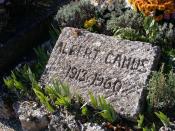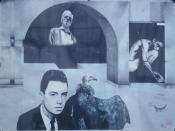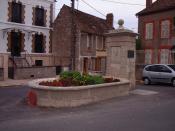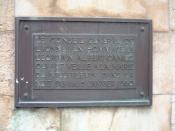Brotherhood is a thin theme throughout Camus' short story " The Guest" and is not really explored. There is a bond of brotherhood of sorts between Daru and Balducci as both French men and as a father - son type. The father - son bond is implied in the relationship to me by the way that Balducci almost humors Daru and tries to counsel him in a fatherly sort of way when Daru objects to the assignment. His stubborn insistence to grudgingly do the job and the way he treated Balducci caused bad blood between the two men. That is definitely not the sort of thing you want in a location like Daru's.
There is also a thin bond of brotherhood of sorts between Daru and (his) Arab prisoner. While Daru may not like his prisoner very much and is very much offended by his stupid crime, Daru felt that turning him over to the authorities was contrary to honor.
It is odd that Daru, of all people, would stand on honor considering how Balducci had to struggle with him to get him to follow "orders". Nevertheless, Daru is as hospitable to his "guest" as is possible, even keeping a very loose watch on the prisoner and giving him carte blanche to escape. Daru couldn't do any more to encourage him to escape unless he held the door open personally.
How does Camus use the setting and descriptions of the landscape to help present and develop the position of Daru? In "The Guest", Albert Camus uses both the setting and the landscape descriptions sparsely but very effectively to help the reader further under stand Daru and what he is about. The utter and absolute isolation of such an extremely remote posting- a colonial mountain village, at Daru's own request- gives us insight into his character. Daru is not what could even remotely be considered a rugged individualist. He chose his location for the solitude it offered. I think he was also counting on the isolation and the diffuculty of the trek discouraging most visitors.
The final scene at the end of this pithy tale where Camus describes the rugged mountains all around him as well as the jagged paths of the desert trail all indicate that whatever your personality is, out there it is man versus nature. When one stands out there at the desert crossroads and looks eastward it is two hours to the (colonial) prison at Tanguit. The trail to the south offered one a good days walk to the nearest nomads who would offer shelter and keep that person on the road to freedom.
After a few close readings of the tale, I really didn't find too much else to offer more insight into Daru. We can draw from his initial and many object ions that he seems to be apolitical in the dangerous sense that he does not know about the daily workings of either the government in Paris or the colonial government. Not only does he not know, he seems to care even less. He had not ever expected that something like this would, or could, ever happen and when Balducci tells him of his orders, he objects, often, hoping, it seems, to get his way by wearing down Balducci in much the same way a child would use this approach on a parent. Playing his last card he tells Balducci that if that's the way it is to be then he will wait for an official declaration of war.
The needed survival instinct together with the isolation of his location could let one say that you are pretty much your own boss and things are done on your timetable. This was a fact that Daru had taken entirely for granted apparently for quite some time. When Balducci reminds him of his obligation as a French national, he continues to object and in the end he finally albeit reluctantly agrees, but only on his terms.





